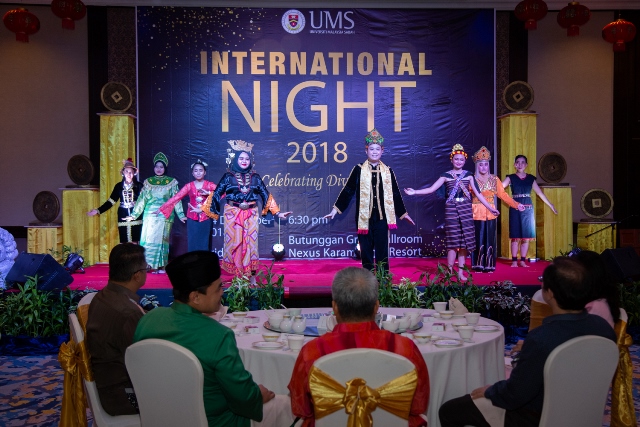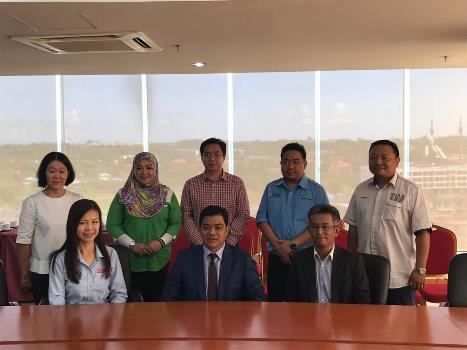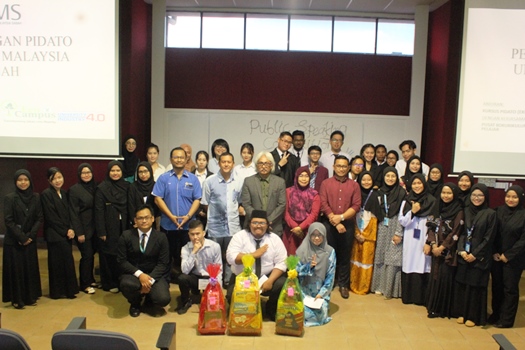 ISNIN, 17 DISEMBER - Universiti Malaysia Sabah (UMS) meraikan kehadiran pelajar-pelajar antarabangsa di UMS dalam satu majlis Malam Antarabangsa UMS 2018 yang berlangsung di Grand Ballroom, Nexus Karambunai Resort baru-baru ini.
ISNIN, 17 DISEMBER - Universiti Malaysia Sabah (UMS) meraikan kehadiran pelajar-pelajar antarabangsa di UMS dalam satu majlis Malam Antarabangsa UMS 2018 yang berlangsung di Grand Ballroom, Nexus Karambunai Resort baru-baru ini.
Bertemakan “Celebrating Diversity” atau Raikan Kepelbagaian, sambutan kali ini diadakan dengan penuh kemeriahan bersama semangat harmoni yang tinggi dalam kalangan para pelajar antarabangsa yang hadir.
Timbalan Naib Canselor Akademik dan Antarabangsa UMS, Prof Dr Rasid Mail ketika mewakili Naib Canselor UMS, Prof Datuk Dr. D Kamarudin D Mudin menyampaikan ucapan perasmian berkata, kepelbagaian yang dibawa oleh para pelajar antarabangsa ini akan menjadikan pembelajaran di UMS menjadi lebih menarik khususnya kepada para pelajar tempatan.
“Ini secara tidak langsung akan menyemarakkan lagi medan ilmu dalam laman UMS dan mampu menjadi nilai tambah kepada ilmu pengajian tinggi di universiti tempatan dengan adanya kehadiran komuniti pelajar antarabangsa.
“Penganjuran majlis ini juga mampu menjadi wadah untuk para pelajar antarabangsa dan tempatan menonjolkan budaya dan mempersembahkan persembahan rakyat dari negara masing-masing, sekali gus meningkatkan pengetahuan mengenai etnik dan bangsa yang pelbagai serta merapatkan lagi hubungan dalam kalangan pelajar dari negara yang berlainan” katanya.
Beliau turut berpesan kepada para pelajar antarabangsa agar sentiasa berusaha bersungguh-sungguh dalam pengajian mereka semasa di UMS kerana apabila mereka berjaya melengkapkan pengajian kelak mereka turut berperanan sebagai duta UMS di negara masing-masing.
Pada majlis tersebut, seramai 301 pelajar antarabangsa, yang terdiri daripada 131 orang pelajar mobiliti, 119 pelajar program intensif Bahasa Inggeris, dan 51 orang pelajar prasiswazah telah terlibat menjayakan penganjuran program tersebut.
Hadir sama Konsul Jenderal Republik Indonesia di Sabah, Bapak Krishna Djelani dan Naib Konsul Negara Brunei Darussalam, Mohd Asulham Haidi Hj Md Ashrane.



 ISNIN, 17 DISEMBER - ‘Hulu Langat Free Range Chicken’ hasil kudrat ikon Alumni Universiti Malaysia Sabah (UMS), Dr. Toong Foo Weng mampu menghasilkan lebih 27,000 ekor ayam bagi satu sesi di kawasan ladang seluas 20 ekar di Hulu Langat, Selangor.
ISNIN, 17 DISEMBER - ‘Hulu Langat Free Range Chicken’ hasil kudrat ikon Alumni Universiti Malaysia Sabah (UMS), Dr. Toong Foo Weng mampu menghasilkan lebih 27,000 ekor ayam bagi satu sesi di kawasan ladang seluas 20 ekar di Hulu Langat, Selangor. JUMAAT, 14 DISEMBER - Pengarah Universiti Malaysia Sabah, Kampus Antarabangsa Labuan (UMSKAL), Prof. Dr. Murnizam Haji Halik mengadakan kunjungan hormat kepada Pengerusi Perbadanan Labuan, Dato’ Sri Hj. Amir Hj. Hussein di pejabatnya, Tingkat 10, Bangunan Menara Perbadanan Labuan, baru-baru ini.
JUMAAT, 14 DISEMBER - Pengarah Universiti Malaysia Sabah, Kampus Antarabangsa Labuan (UMSKAL), Prof. Dr. Murnizam Haji Halik mengadakan kunjungan hormat kepada Pengerusi Perbadanan Labuan, Dato’ Sri Hj. Amir Hj. Hussein di pejabatnya, Tingkat 10, Bangunan Menara Perbadanan Labuan, baru-baru ini. JUMAAT, 12 DISEMBER – Sambutan perayaan Deepavali Fakulti Perubatan dan Sains Kesihatan (FPSK) berlangsung meriah baru-baru ini.
JUMAAT, 12 DISEMBER – Sambutan perayaan Deepavali Fakulti Perubatan dan Sains Kesihatan (FPSK) berlangsung meriah baru-baru ini. JUMAAT, 14 DISEMBER - Norsharifah Waty muncul johan Pertandingan Pidato anjuran Kursus Pidato Universiti Malaysia Sabah (UMS) yang berlangsung di Dewan Kuliah Pusat 1, Pusat Persediaan Sains dan Teknologi UMS, baru-baru ini.
JUMAAT, 14 DISEMBER - Norsharifah Waty muncul johan Pertandingan Pidato anjuran Kursus Pidato Universiti Malaysia Sabah (UMS) yang berlangsung di Dewan Kuliah Pusat 1, Pusat Persediaan Sains dan Teknologi UMS, baru-baru ini.